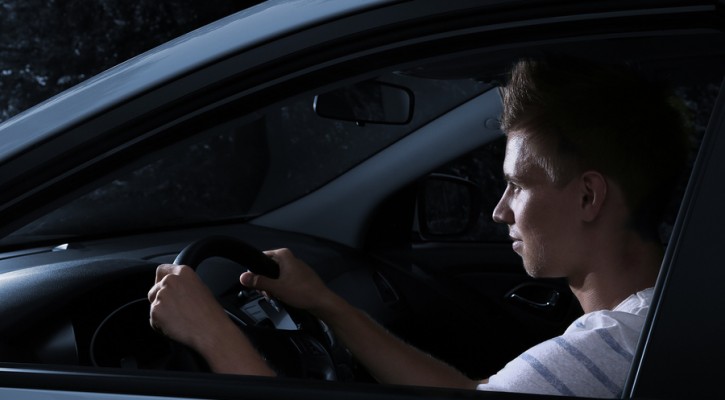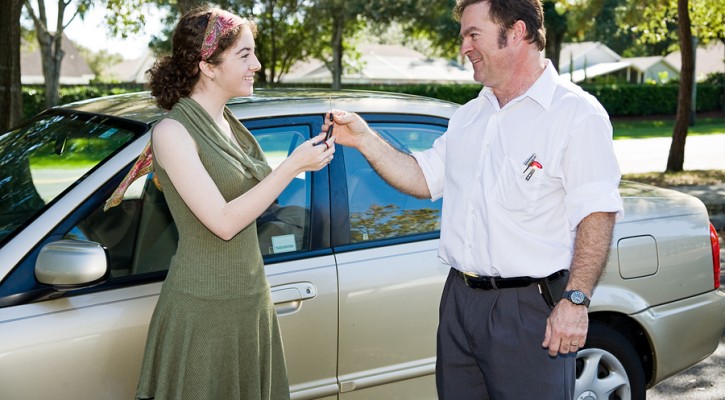Tag Archive: gdl

Iowa Parents Need Teen Driver Education
March 17, 2015
Iowa parents are putting their teen drivers in danger – in writing. According to a study by the Iowa Department of Transportation, a majority of Iowa parents signed waivers that exempted their teen drivers from passenger restrictions under Iowa’s Graduated Driver License (GDL) law.
In 2013, the Iowa legislature passed a law that restricted the number of passengers a teen driver can carry to one unrelated passenger for the first six months after receiving their intermediate license. This is a common GDL law that has been passed in many states. In some states, teen drivers can’t carry any passengers other than a sibling for the first six months.
GDL laws were passed in an effort to allow more time for a teen to gain more driving experience without distractions. The reason for the passenger restrictions is that, the more teen passengers a teen driver carries, the more distracting the driving situation is. According to the Governors Highway Safety Association, adding just one passenger increases a teen driver’s crash risk by 50 percent. Put three or more passengers in the car, and that “risk is nearly four times greater.
The Insurance Institute for Highway Safety says that Iowa could cut its fatal teen crash rate by more than half if tougher teen driving laws were enacted.
For some reason, when the Iowa legislature passed this law, they included a provision that allowed parents to sign a waiver that exempted their teen from the passenger restriction provision. This appears to be a popular provision because 90 percent of parents of teen first time drivers have signed the waiver.
If parents were educated on just how dangerous teen passengers of teen drivers can be, they might reconsider and revoke the waiver. Even without such a law, parents should limit the number of passengers their teen driver can carry until the teen driver has six months to a year of driving experience.
Read more: Majority of Iowa parents waive teen driving restriction

Ask The Driving School Instructor: Why is it illegal for teens to drive late at night?
June 9, 2014
Question: Why is it illegal for teens to drive late at night? With fewer cars on the road it seems like it would be safer.
Answer: The short answer is that teen death rates skyrocket during those hours. There are several reasons for this. One is the lack of driving experience hasn’t exposed young drivers to all the possible hazards they might encounter on the roads and night time driving has its own particular types of hazards. The most obvious hazard is that it’s dark and it’s hard to see things on the road. Another is that there are many more drunks on the road at that time of night and a drunk driver, when confronted with bright lights will tend to drive toward the lights making it difficult to avoid a crash. The third reason is that people are tired and studies show that teens especially, with their busy schedules, don’t get all the sleep they need. Add distracting teen passengers and speed to that mix and the hazards multiply. The graduated driving laws are designed to ease teen drivers into the driving situation and allow them to gain driving experience before being allowed to drive with no restrictions.

Teen Death Rates Decline In States With Strong Graduated Driver License Laws
April 2, 2012
A 2006 study by the Johns Hopkins Bloomberg School of Public Health that showed Graduated Driver License Laws (GDLs) reduced teen death rates by an average of 11% has been backed up by at least two states that have shown a significant decline in their teen fatality rate after enactment of tough new GDLs.
New Jersey’s strong GDL laws will become even stronger with new GDL regulations as a result of recommendations by the Teen Driver Study Commission. The new laws or regulations are:
- No plea bargains for GDL holders (teens can’t plea bargain away points for traffic violations). Teens who accumulate 3 or more points, must attend a 4-hour MVC Probationary Driver Program and be monitored for 12 months. Any accumulation of points during the monitoring period will result in a 90 day license suspension.
- Use of a decal on the vehicle to identify drivers who hold a learner’s permit or provisional license.
- 11 PM curfew for all drivers under the age of 21 who hold a permit or provisional license.
- Limit of passengers to just one – regardless of family affiliation.
The Illinois Secretary of State introduced figures that showed a 53% drop in teen deaths between 2007 and the first 9 months of 2009. Illinois sanctions on drivers during the Initial Licensing Phase include:
- Two moving violation convictions occurring within a 24-month period will result in a minimum one-month driver’s license suspension. Suspension length is determined by the seriousness of the offenses and the driver’s prior driving history. An additional driver’s license suspension will result for each subsequent moving violation following the initial suspension.
- Any moving violation conviction that occurs within the first year of licensure will result in a six-month extension of the passenger limitation, which allows no more than one unrelated passenger under age 20.
- Suspended drivers are required to attend a remedial education course, may be retested and must pay a $70 reinstatement fee.
Parents who don’t live in a state with a strong GDL law, can impose their own strict restrictions. If you are not sure what the GDL law is in your state, visit your state’s web site or: http://www.iihs.org/iihs/topics/t/teenagers/qanda#teenagers–graduated-driver-licensing

Five Tips After Teens Get Their Driver’s License
October 8, 2010
Once a teen gets their driver’s license, they will want to apply their new skill all the time. Some teens even volunteer to be the family driver and errand runner! (Depending on what age, and what kind of license they have.) But just because they have their license, the process of learning to drive isn’t over. Driver’s Education is continuing education, and there are still several things to tackle.
Here are a few tips for teens after they get their license:
- Encourage your parents to sign a parent-teen driving contract. If you don’t have one set up already, then show the initiative. Be the teen who demonstrates to their parents or guardian that they are willing to agree to some terms if they are going to help shoulder the responsibility of driving. It will save you both from any misunderstandings, over-reactions, and hard feelings, on the interpretations, expectations and consequences of your driving privilege.
- Practice, practice, practice. Though the teen may have his/her license, it’s easy for them and their parents to get complacent. While they may be skilled on how to drive, mastering and fine-tuning their skills only comes with experience. There’s still always much to master when it comes to driving, and asking a parent for help more not only increases that teen’s driving ability and safety, but also makes him/her bond closer with their parent. The evolution from learning to drive to becoming a safe and defensive driver is a long term progression. Parents need to stay engaged through out the process.
- Clear the dashboard. Like life, teens should remove unnecessary distractions when it comes to driving. Have disc-changers ready and music set before starting the vehicle. Keep cell phones in the glove compartment away from the driver’s reach. Also important, don’t be a chauffeur for friends. Having other teens in the car is a major form of distraction while driving, and research shows it increases the risk of a crash per passenger, exponentially.
- Clear your head someplace else. Driving isn’t a stress-reliever. When a teen has a problem, he/she shouldn’t use driving to clear his head. When a preoccupied mind does something that requires full attention, like driving, there is more likely to be mistakes. Having a talk with a friend, when you are not doing something else (like driving) is one of the best ways to cool one’s head. Driving when you are upset, angry or even extremely happy can be dangerous.
- Check the labels. Before taking any form of medication, even over-the-counter drugs, remember to check the labels. Some drugs have side-effects when taken, which may include dizziness or drowsiness. Either of which is never good for driving. Some medicines may give off false driving-under-the-influence signals. Make sure you are rested and in good health. Your physical health and well being can affect awareness, judgment and reaction time each important for safe driving.
Having your driver’s license does not mean you are good to go. In order to be a safe driver, there is still continuing education needed and defensive driving techniques to learn. Take advantage of this time to continue to be engaged in driver education as you gradually increase the opportunities and responsibilities driving brings.

Parents are the Key to Teen Driving Safety
April 6, 2010
Imagine your 16-year old, late after his first solo drive — the phone rings and it’s your child, asking you to pick him up. He lets you know that he had an accident. You feel relief that everyone is safe, you bring both the vehicle and your child home. As you begin to understand what happened, you think how could I have prepared my child for this situation.
Having a conversation about how to handle a vehicle emergency is the right start. For many new drivers, more behind the wheel experience in a variety of driving scenarios including adverse weather conditions or driving on the highway can greatly improve their driving skills. In addition making sure that the car is properly maintained should also be a priority.
For many new drivers, parents are the key to teen driving safety.
The first few years are the most dangerous for the new driver. Statistics don’t lie — for nearly a decade, (1995 – 2004) more than 30% of all crashes involved teen drivers. Leading to the creation of the Graduated Driver’s License law, making parents more important in the lives of their teen drivers. These laws allow for a new driver to prove their maturity and trustworthiness.
Depending on what state you live in, your teen driver might need more in-car experience. As mentioned above, various states have a form of the GDL law, requiring up to 50 hours of supervised driving, including 10 hours of night-time driving. To help track and log your teens driving hours you can use a Teen Driving Experience Log Book to track the maneuvers practiced, the weather conditions or even the route.
There is bond that helps children understand a lesson better, if taught by his parents. Please keep this in mind as your child prepares for the responsibility of driving. Remember, parents are the first teachers for most experiences in their teens life.
For additional information on Graduated Drivers License Laws read:
Four Ways Teens Benefit from Following Graduated Drivers License Laws
